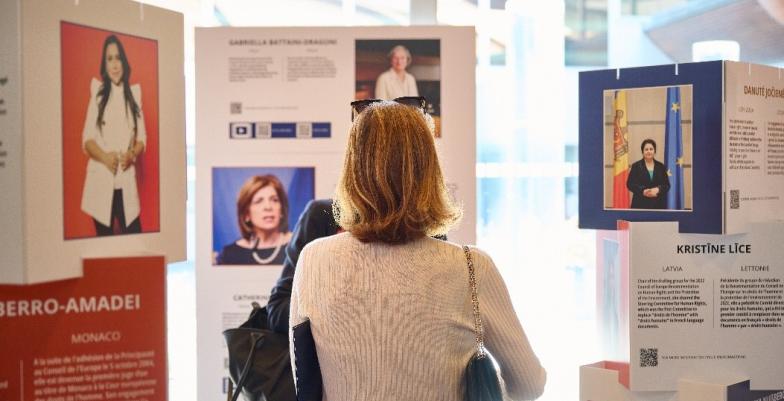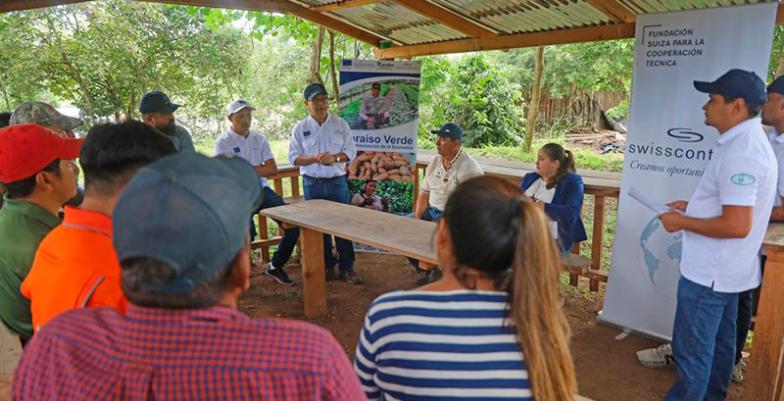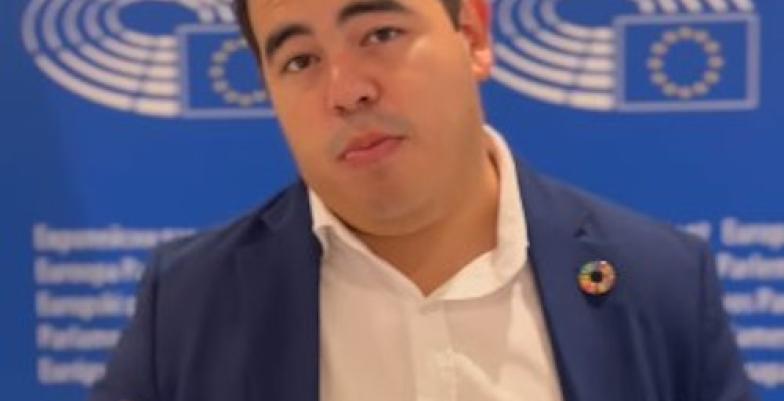Global Food security
EU at the forefront of global efforts
Addressing global food insecurity is an essential part of EU’s contribution to the global rules-based order and the implementation of the 2030 Agenda for Sustainable Development in the years to come. We are at the forefront of global efforts to address food insecurity that is affecting hundreds of millions of vulnerable people in developing countries.
The EU published on 23 March a Communication on safeguarding food security and reinforcing the resilience of food systems. The Communication addresses both the internal EU (support to farmers and consumers in the EU) and the global dimension. The measures proposed included, among others, stepping up agricultural production within the EU to mitigate shortages on the global market; avoiding export restrictions and export bans on food; stepping up humanitarian assistance; supporting partner countries’ transformation to a more resilient and sustainable agriculture; or funding agricultural research and innovation.
The EU is working in partnership with the international community, including with the UN-led Global Crisis Response Group (GCRG) on Food, Energy and Finance, and the G7 Global Alliance for Food Security (GAFS).
In line with the Council Conclusions adopted on 20 June, the EU is delivering on a comprehensive response along the four strands of the “Team Europe response to global food insecurity”: Solidarity, Production, Trade and Multilateralism. The EU alone is providing over EUR 8 billion for the period 2021-24 to support vulnerable populations and countries. EU Member States have committed billions more. The EIB is also contributing with over EUR 4 billion to these efforts.
Team Europe’s response to global food insecurity
The EU is stepping up its humanitarian support in response to the growing needs and urgent calls from humanitarian agencies. We are providing around EUR 2.5 billion in humanitarian food assistance to most vulnerable populations, along a humanitarian-development-peace nexus.
This includes around EUR 950 million for humanitarian assistance for 2022 only, which represents a 60% increase compared with 2021. These funds are being primarily directed to the countries most affected by food insecurity, such as Yemen, Syria, Afghanistan, Sudan, Somalia, Ethiopia and South Sudan. Most recently, the EU has mobilised EUR 395 million of its humanitarian aid emergency reserves to mitigate the most pressing humanitarian consequences. Examples include:
In order to mitigate the consequences of Russia’s war of aggression against Ukraine, we set up a new "Food and Resilience Facility" to support the most affected among our Southern Neighbourhood partners. Under this Facility, EUR 225 million are being deployed, tailored to the needs of countries in the region highly dependent on food imports disrupted by the war).
The EU’s recent EUR 100 million contribution to the IMF’s Poverty Reduction and Growth Trust (PRGT) is supporting vulnerable countries that are facing higher import prices and disruptions of food and fertilisers supply chains. This contribution allows the mobilisation of about EUR 630 million of concessional loans.
The EU is providing around EUR 3.4 billion in 2021-2024 for medium-term investments in food security and sustainable food systems in partner countries.
This includes an additional EUR 350 million to boost sustainable food production in African, Caribbean, and Pacific (ACP) countries. The EUR 350 million support is operationalised through 20 localised programmes with a common thread: increasing sustainable food production while decreasing the dependence on unsustainable agriculture inputs.
We support Ukraine to continue producing its agri-food products such as grains and oilseeds, including through a new EUR 50 million grant scheme which helps more than 28,000 farmers to buy seeds and other inputs.
In the EU Southern Neighbourhood, the Food and Resilience Facility contributes for instance to top-up programmes aiming at: increase local food production (Tunisia, Egypt), restoring the potential for cereal production or grain storage capacity (Tunisia, Egypt), promoting organic farming, agriculture conservation and soil restructuring (Morocco, Tunisia), a more efficient use of water for agricultural purposes (Jordan) and the development of organic agro-food business (Algeria).
In the Western Balkans and Türkiye, the EU provides significant pre-accession support of at least EUR 484 million to 2024 to develop sustainable food systems.
The EU is actively working on addressing fertilisers’ shortages and price increases globally as highlighted in the new Communication on fertilisers published on 9 November. Concretely, the EU helps its partners to reduce their dependency on imported mineral fertilisers by investing in efficiency of use, alternative green and organic fertilisers, and sustainable agricultural practices and soil fertility management (e.g. agro-ecology). The EU has also joined the US led Global Fertiliser Challenge (GFC) initiative.
-
Global Trade
We are helping to stabilise global food and fertilisers prices, including through restoring Ukraine’s full export potential and ensuring increased food availability to countries most in need, by supporting three key initiatives:
The EU-Ukraine Solidarity Lanes
The Solidarity Lanes have become the lifeline for Ukraine, its economy and its people, allowing the export of more than 34 million tonnes of Ukrainian goods, including over 19 million tonnes of agricultural products (vital for alleviating global food insecurity and more than the Black Sea route), and generating an estimated total income of over EUR 15 billion since May. As announced in the Joint Declaration of 11 November, the Commission, together with the European Investment Bank, the European Bank for Reconstruction and Development and the World Bank, is mobilising EUR 1 billion to support the Solidarity Lanes.
The Black Sea Grain Initiative
The Black Sea Grain Initiative (along the Solidarity Lanes) is delivering in stabilising food prices and increasing food affordability, which is key to address the current food crisis. By getting food to the global markets, the Black Sea Grain Initiative and the Solidarity Lanes have contributed jointly to a 15% drop of the global food price since the food price peak in March.
Under the initiative, around 14 million tonnes of grain and other agricultural products have been exported from Ukraine through the Black Sea ports of Chornomorsk, Odesa and Yuzhny/Pivdennyi until mid-December. Through this initiative, the WFP is also able again to export grain from Ukraine to countries most in need. Shipments purchased by the World Food Programme are going directly to the people most acutely food insecure.
Grain from Ukraine Initiative
The EU supports Ukraine’s initiative “Grain from Ukraine” launched by President Zelensky on 26 November to facilitate grain exports to countries most in need, and Ukraine’s commitment to global food security. The goal is to send 60 ships to the poorest countries by the summer of 2023. Over half of EU Member States, as well as the US and the UK have so far announced contributions to this initiative.
The EU has stepped up its engagement with the UN Rome-based agencies (WFP, FAO and IFAD) that are at the forefront of operationalising the global response to food insecurity, to advocate for swift and effective actions. We are actively supporting the political coordination led by the UN Global Crisis response Group on Food, Energy and Finance and are working jointly in support of practical and timely solutions.
Roadmap - Call to Action: The EU is committed to overcome global food insecurity by working together to create innovative partnerships – including international financial institutions and other key stakeholders.
Alliance on Food Security (GAFS): As a member of the Global Alliance for Food Security, initiated by the G7, the EU is part of the coordination efforts to address food insecurity. One concrete deliverable has been the Global Food and Nutrition Security Dashboard, a new key tool to consolidate and present up-to-date data on food crisis severity, track global food security financing, and make available global and country-level research and analysis.
IMF Food Shock window: The EU supports the IMF’s recently launched Food Shock Window to mitigate urgent balance-of-payments needs for (i) countries hit by higher import prices for food and fertiliser and disruptions of supply chains for food importers and (ii) those that witness a sudden loss of revenue from their food exports.
We are cooperating with key partners and international organisations (in particular in the WTO, G7, G20, FAO) in order to avoid restrictions to trade and ensure an open, transparent and predictable trade environment.
In the G20, the EU effectively promotes investments in the resilience of food systems and defends multilateralism. In addition, we support specific initiatives such the Agricultural Market Information System (AMIS) and its expansion to key agricultural inputs such as fertilisers. This should help better informing policy-making and bring more transparency and stability to world markets.
In the World Trade Organisation (WTO), the EU is actively engaged in supporting the food security agenda, by advocating against unjustified export restrictions, in favour of increasing transparency and promoting free trade. At the 12th Ministerial Conference held in June 2022, the EU was instrumental in adopting: a) the exemption from export restrictions for the World Food Programme humanitarian food purchases (Ministerial Decision on World Food Programme Food Purchases Exemptions from Export Prohibitions or Restrictions) and b) the political commitment to a Ministerial Declaration on the Emergency response to food insecurity.
Additional information:
https://ec.europa.eu/commission/presscorner/detail/en/FS_22_6882







